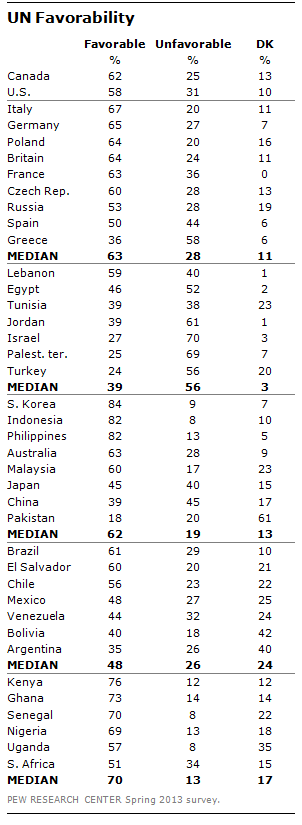In his speech to the United Nations General Assembly on Tuesday, President Obama put a particular focus on the conflicts in the Middle East and North Africa. Obama noted that the U.S. has been “chastised for meddling in the region” by some countries and blamed by others “for failing to do enough to solve the region’s problems.”

The UN faces its own doubters in the region. A Pew Research Center survey this spring found that a median of 56% in seven Middle Eastern and North African countries had an unfavorable view of the international organization, while just 39% saw it favorably.
That finding stood in sharp contrast to global opinion elsewhere: clear majorities in 22 of 39 countries surveyed said they had a favorable view of the UN. A median of about six-in-ten or more had a favorable view of the UN in Europe, Asia and sub-Saharan Africa. Views of the UN were generally favorable in Latin America, where 48% had a favorable opinion of the UN and 26% an unfavorable one, with 24% registering no opinion.
In the Middle East, three-quarters of Israeli Jews had an unfavorable opinion of the UN, although Israeli Arabs had a more positive view (53% favorable vs. 43% unfavorable). Among all Israelis, favorable ratings for the UN are down 11 points since 2007.
In the Palestinian territories, equal numbers in the West Bank (67%) and Gaza Strip (69%) had an unfavorable view of the international body.
Nearly six-in-ten in Lebanon (59%) saw the international peacekeeping entity favorably, but there was a sectarian divide. Majorities of Lebanese Christians (62%) and Sunni Muslims (76%) gave the UN a positive assessment, while only 29% of Lebanese Shia agreed.
